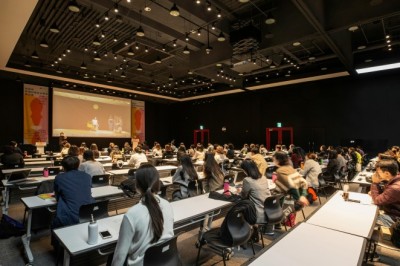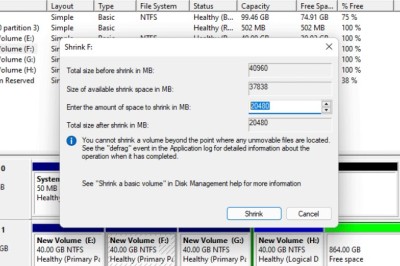views

Managing a business conference requires balancing a number of responsibilities to give participants a smooth, interesting, and effective experience. It involves meticulous planning, foreseeing obstacles, and making sure the event meets its objectives. A systematic strategy is necessary for efficient conference management, regardless of the size of the event—from a small team gathering to a major industry summit. These are some important factors to consider for a successful event.
1. Clear Objectives and Goals
Every great conference starts with a clear purpose. Think on what you want the event to achieve before you start with the logistics. Are you trying to create leads for your company, promote networking possibilities, or give fresh perspectives on the industry? Setting specific goals enables you to organize sessions, events, and content that will benefit your participants and forward your objectives. These objectives will also act as standards by which to measure the conference's future success.
2. Choosing the Right Venue
Your conference's atmosphere is shaped by the location. A room that is welcoming, easily accessible, and furnished with the appropriate amenities makes all the difference in the world. Think about things like parking, capacity, location, and technological requirements. Natural light-filled spaces and breakout spaces can boost output and maintain attendance' energy levels. To make sure the place lives up to your expectations, always visit it in advance.
3. Curating an Engaging Agenda
Throughout the session, participants are kept enthusiastic and attentive by an interesting agenda. To accommodate varying learning styles, combine interactive workshops, panel discussions, and keynote addresses. Don't jam too many programs into one day; instead, schedule breaks to allow participants to network and refuel. Make sure the speakers you choose are subject-matter experts who can offer insightful commentary that will stick with you.
4. Professional Event Photography
To highlight the success of your conference and advertise subsequent meetings, you must document key moments. Employing experts in corporate photography guarantees that you will capture important events, such as speakers, networking opportunities, and audience participation, in excellent quality. To establish credibility and draw people to upcoming conferences, you can use these images on your website, social media accounts, and promotional materials. Expertly taken photos enhance the intensity and vitality of your event and help tell its story.
5. Efficient Registration and Check-In
A smooth registration process sets a positive tone for your event. Use online platforms to allow attendees to register in advance and avoid long queues on the day of the conference. Digital check-ins with QR codes or mobile apps streamline the process further, making it efficient and stress-free. Friendly, organized staff at the check-in desk also create a welcoming experience for guests. Ensuring a seamless process builds excitement and sets a professional standard. For larger events, consider offering pre-event communication, like confirmation emails or app reminders, to further reduce confusion and improve the check-in flow.
6. Leveraging Technology for Seamless Management
Event management software facilitates efficient registration scheduling, session scheduling, and update communication. While mobile apps provide interactive features like live polls, Q&A sessions, and agenda tracking, live-streaming capabilities enable participation from distant attendees. Tech-savvy solutions improve the experience of attendees while ensuring your convention runs successfully. Technology integration enables you to track participation, get real-time feedback, and make any adjustments.
7. Creating Networking Opportunities
One of the main reasons people attend conferences is to network. Design your event to encourage meaningful connections among attendees. Include dedicated networking sessions, interactive breakout rooms, or themed coffee breaks to help participants engage with one another. Providing tools like name badges, digital contact-sharing options, or an event app makes networking easier and more effective. Structured opportunities like speed networking or mentor-matching programs also help participants overcome initial shyness.
8. High-Quality Catering
Having excellent food guarantees that guests remain alert, content, and concentrated. Provide a range of meal options to accommodate allergies and dietary requirements. Coffee stations, buffet-style meals, and healthy snacks make a good impression and keep guests energized all day. Providing innovative food stations, such themed cuisine or build-your-own salad bars, can improve the experience and promote conversation during meals, transforming breaks into fruitful networking opportunities.
9. Effective Communication Before and After the Event
Keeping attendees informed is critical to conference success. Send regular updates through emails, newsletters, or event apps before the conference. Clearly communicate the agenda, venue details, parking instructions, and speaker lineups. After the event, follow up with thank-you notes, feedback surveys, and key takeaways. Effective communication keeps attendees engaged and helps you improve future events.
10. Post-Event Evaluation
After the conference is over, the work continues. You may gauge success and pinpoint opportunities for development by carrying out a post-event assessment. To find out what guests liked and what may be improved for the next time, gather feedback via surveys or online forms. You can make sure you're constantly getting better and adding value with every conference by reviewing important metrics like attendance, engagement, and ROI.
11. Fostering Sustainability at Events
An element of event planning that is becoming more and more significant is sustainability. Your conference's environmental impact can be reduced by using eco-friendly procedures, such as providing digital agendas rather than printed ones, cutting back on single-use plastics, and choosing locations that value energy efficiency. Encouraging sustainability also enhances your brand by demonstrating to guests your concern for the wider picture.
12. Offering Engaging Post-Conference Content
Your conference doesn’t end when the last attendee leaves the venue. Sharing engaging post-conference content keeps the momentum alive. Recap highlights through blog posts, share recordings of key sessions, or create infographics summarizing key insights. Providing attendees with valuable content after the event strengthens their connection to your brand and reinforces the messages shared during the conference.
Effective business conference management calls for careful preparation, close attention to detail, and an emphasis on making attendees' experiences enjoyable. Every step contributes to success, from hiring experts for photography to utilizing technology and establishing specific goals. You can organize a flawless and unforgettable event that meets your company goals and inspires guests by concentrating on these important factors.
























Comments
0 comment